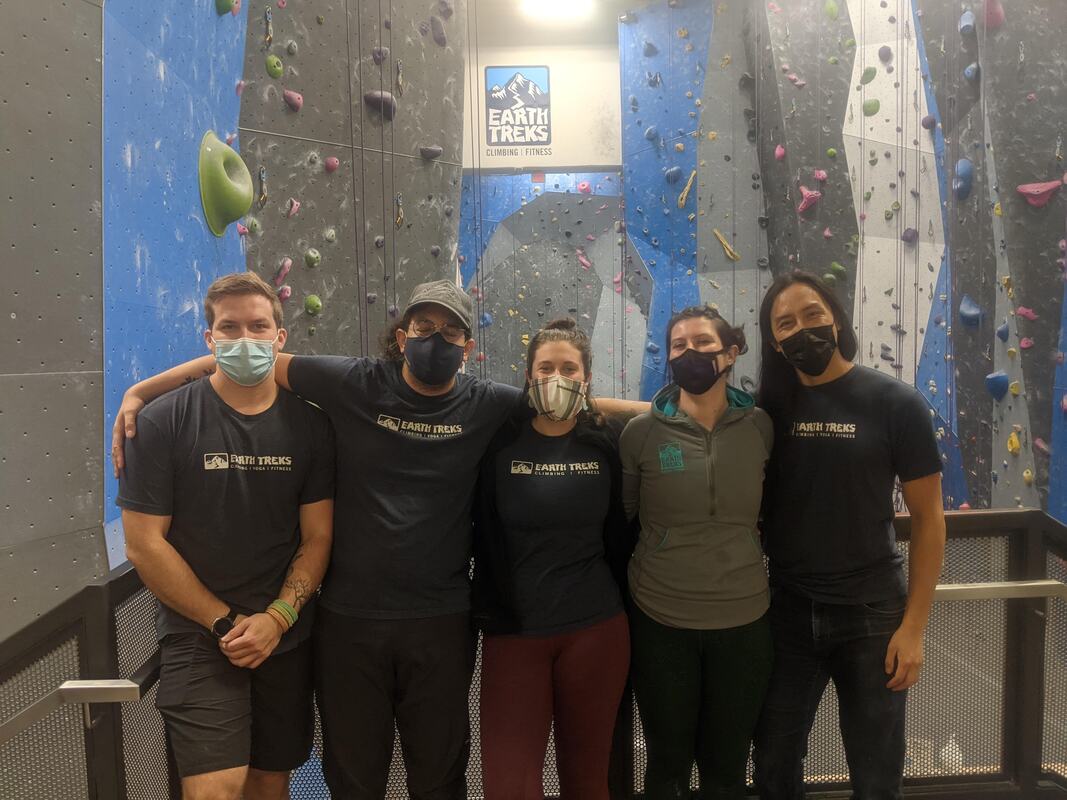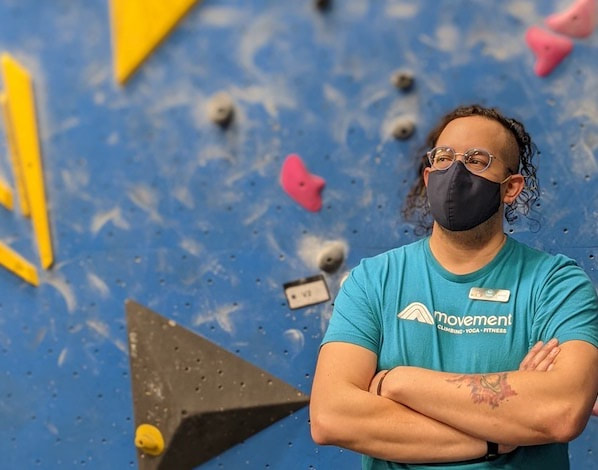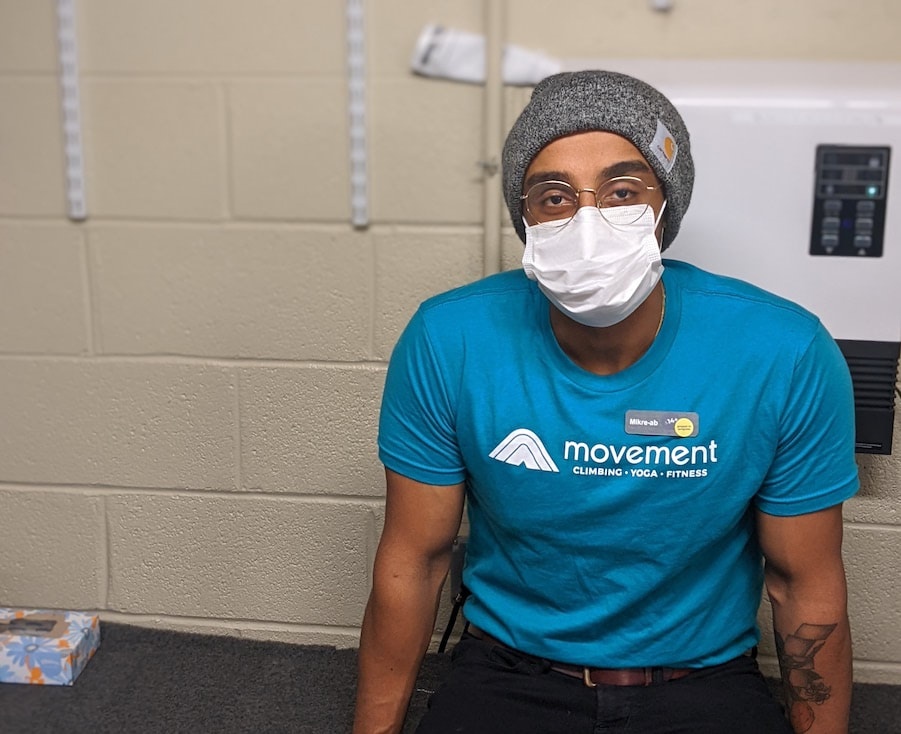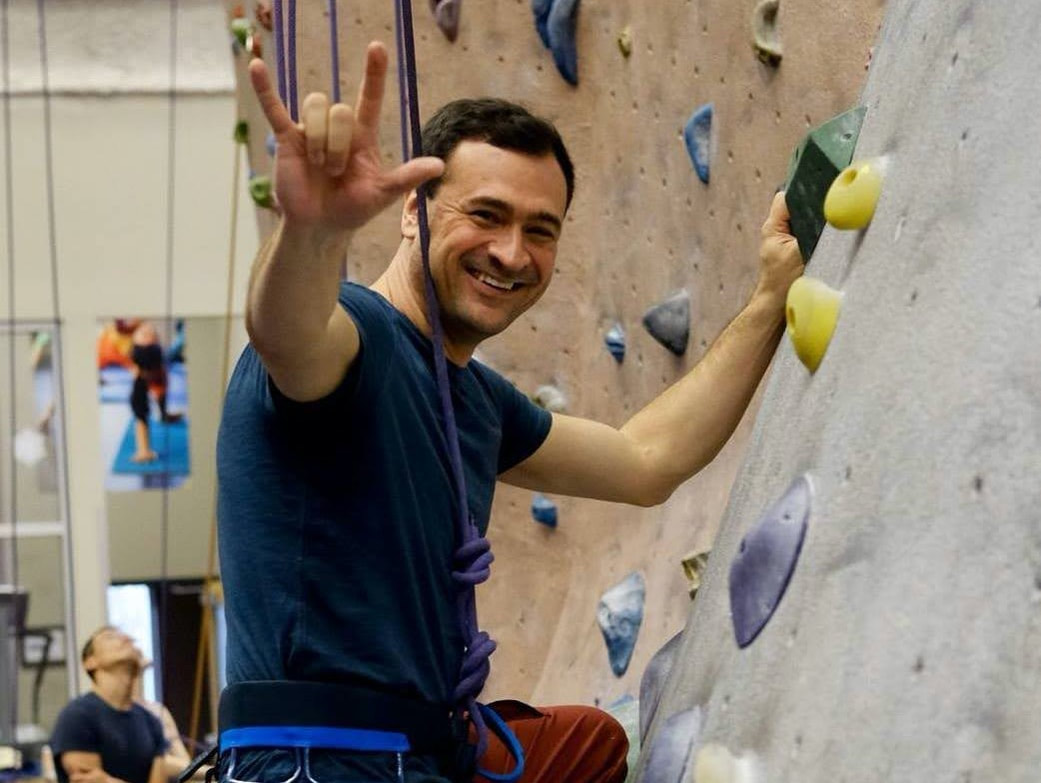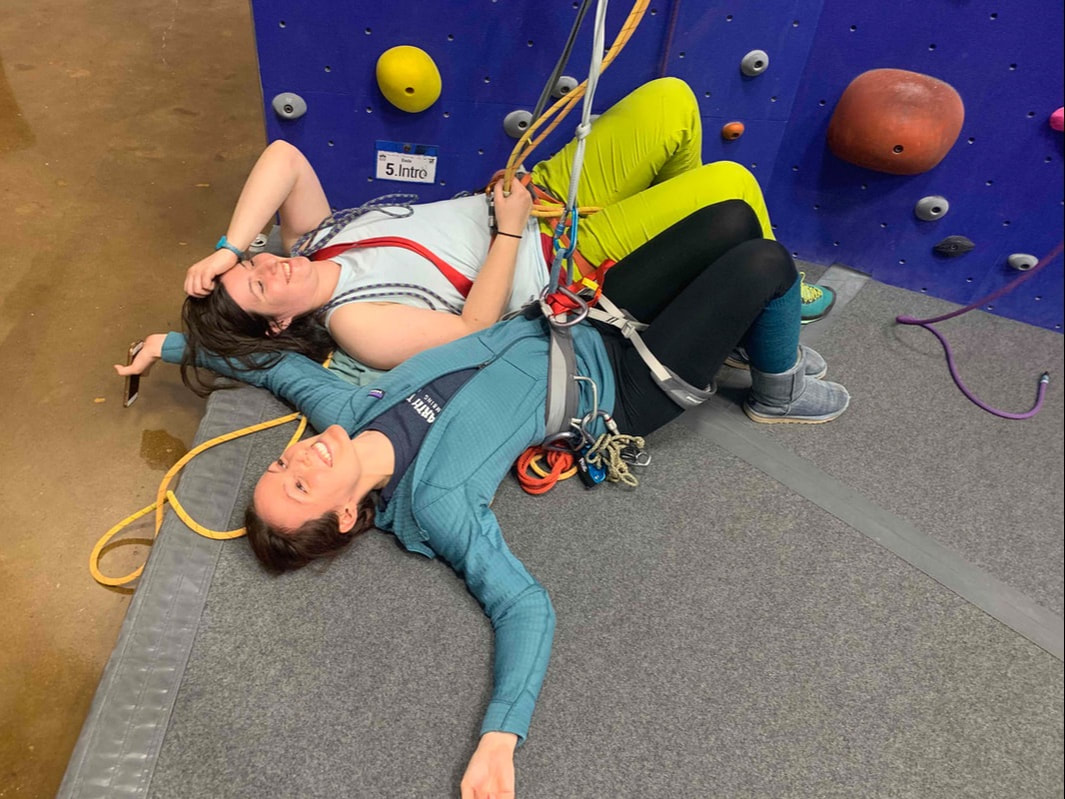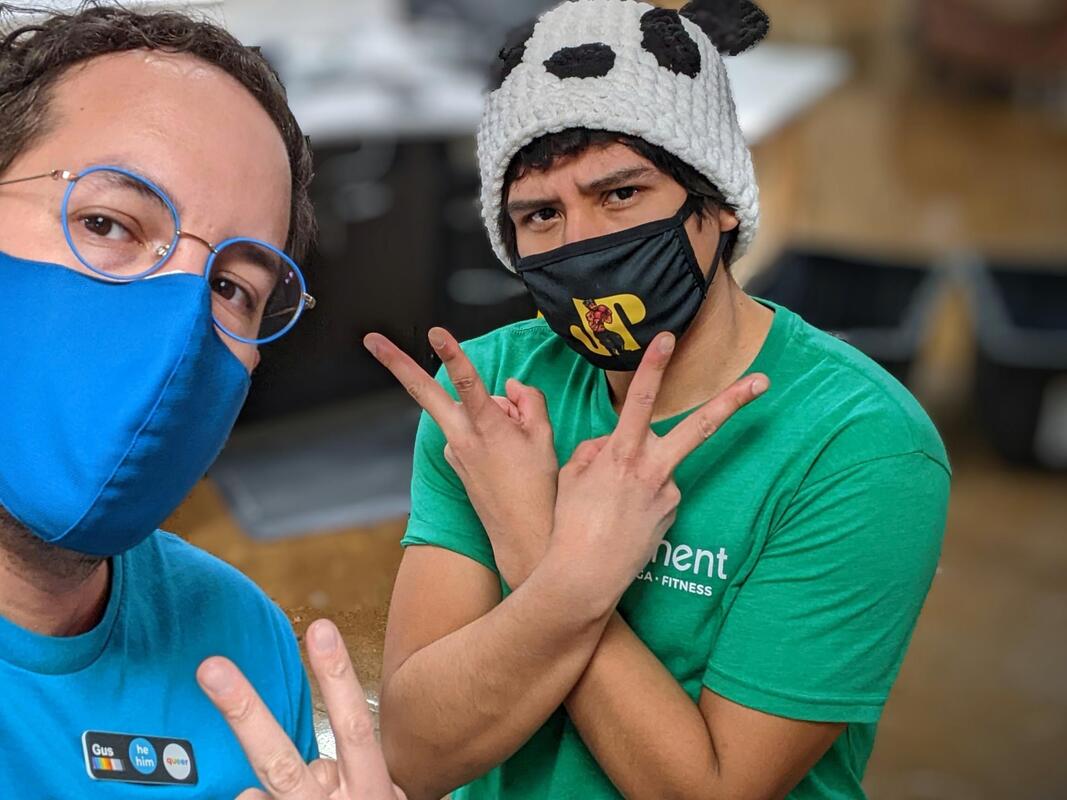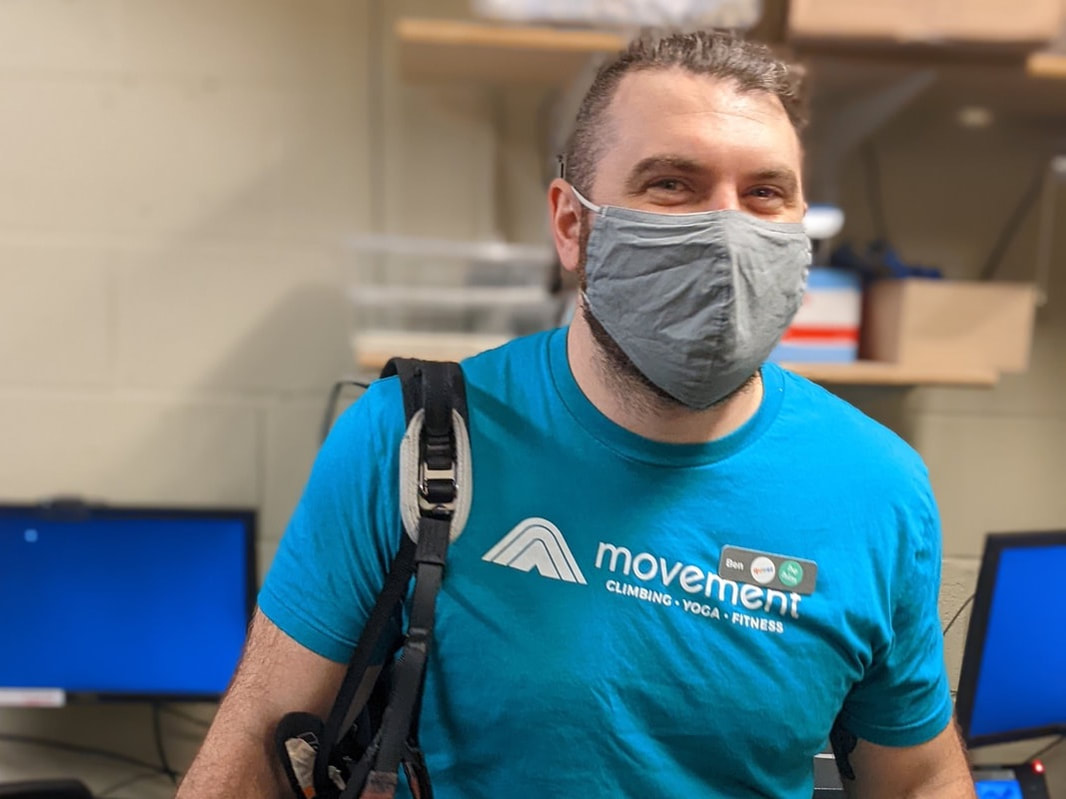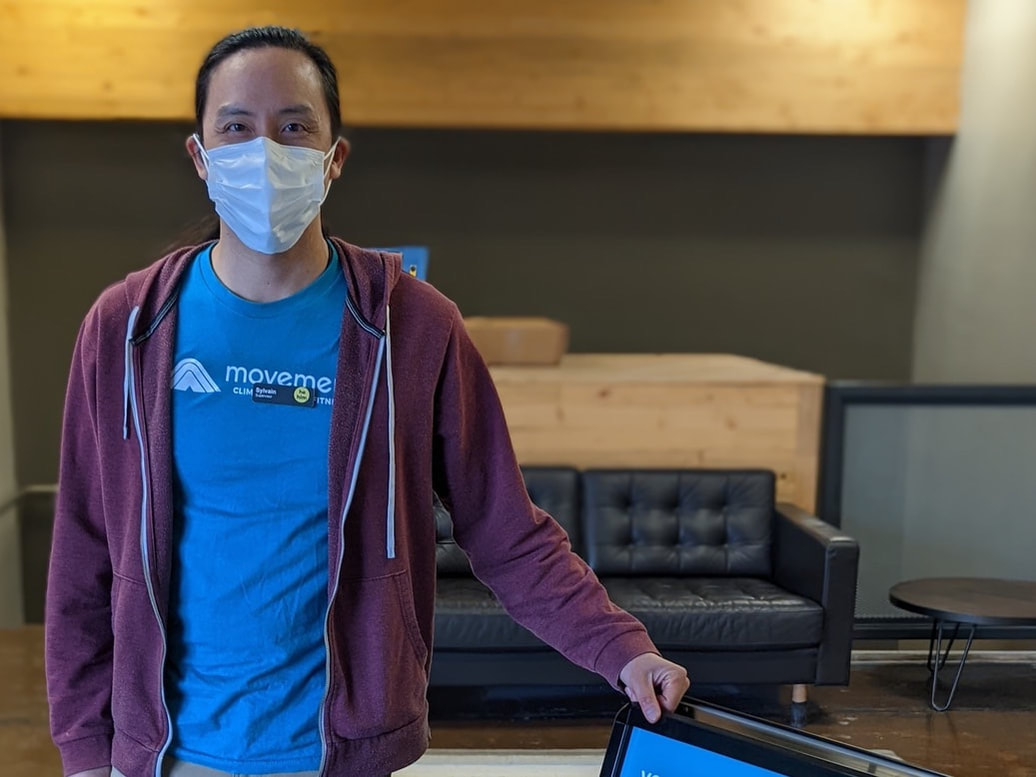|
Climbing is a team sport. Yes, we are alone on the wall, but we are connected to our belayer to catch us if we fall. Same with bouldering. It may be just you and the climb, but our team roots us on, carries a pad or two, and spots us on that sketchy crux. The employees at the Movement Climbing Gym in Crystal City, Virginia are trying to create a whole new kind of climbing team – one amongst fellow workers, where their employee rights are protected. Workers at Movement Crystal City are trying to establish the first climbing gym union in the U.S.
Ask the workers why they decided to organize and you’ll get a range of answers, but one thread runs amongst all of them: they want to ensure that workers will have a voice in the decision-making process of Movement Crystal City and ensure that those who are most instrumental in developing the gym’s culture are not left behind. Until December of 2021, when the company rebranded, Movement Crystal City was known as Earth Treks. Earth Treks was founded by Chris Warner in 1989 as a climbing school and opened its first indoor gym in 1997. In 2017, the company was operating five facilities when they partnered with Tengram, a private equity firm. Later that year, Chris Warner announced that the company would be merging with Planet Granite, another climbing gym chain from the west coast. This merger created the largest climbing gym operator in the United States. As part of the merger, the two brands retained their identities, but formed the corporate entity El Cap, headed by Robert Cohen, a former vice president of Patagonia. In recent years, Seawall LLC, another private equity firm, has also invested in El Cap facilities. Movement currently operates twenty locations across the country in California, Oregon, Colorado, Texas, Illinois, Virginia, and Maryland.
As the company has grown and corporatized there have been some positive changes for employees including the addition of sick leave, paid time off, and wage increases. However, not all changes have been positive. Gus Mason, an organizer, said, “With each passing year more decisions are made by senior leadership in corporate offices who are removed from local management and workers. Increasingly, there has been poor communication and decisions made rapidly without consideration for how changes will be implemented in local gyms. We don’t believe this is due to intentional oversight or malevolence, but because they are principally beholden to investors, leadership is limited in what they will do for employees at all levels. Through a union contract negotiation, the workers will decide for ourselves how we want to be represented as a group, what we want to prioritize, and what we're willing to compromise on. The company will be required to bargain with us in good faith and will be accountable to us as well.” |
The People of Movement Climbing Gym Crystal City, VirginiaGus has worked at Movement Crystal City for over 3 years. As a fulltime worker until the end of last year, he'll tell you he's spent a lot of time at the gym but not enough of it actually climbing. Now that he's working part-time, he is excited to climb more, and help build up our union! He got his start climbing at Teko Cave, a tiny bouldering gym in Yokohama, Japan with an incredibly international community. Ever since he's seen climbing as a wonderful way to bring people together from all walks of life. If he isn't climbing, Gus is cycling between his special interests like gaming on his PC or Switch, backing an aggressive number of Tabletop RPGs on Kickstarter, or learning new languages. Despite several years of political organizing under his belt, this is the first Union organizing effort he's undertaken. Mikre-Ab Abera has worked at Crystal City Movement for 4 years as a climbing instructor, youth coach, and community guide. When he's not working at the gym, you can usually find him training on the bouldering walls or 'psssaaat'-ing on ropes. He considers the gym his second home, and loves that he has an incredible community of climbers to spend time with. This community is the very reason that he is in support of a union. He believes that workers deserve to have an equal voice in the issues that concern them such as wages, benefits, and overall quality of work |
|
|
On June 29, 2021, the organizers sent an official notice to the parent company, El Cap, of the intent to unionize. Workers shared that the response was “swift and decisive” - El Cap was “not in favor of unionizing.” Workers shared that El Cap held mandatory employee meetings and encouraged staff to say “no” to unionization. But, according to federal labor law, although a company is allowed to state its opinion, it is not up to the company whether or not the staff can unionize; It is up to the employees and in a secret ballot election, Crystal City employees voted 28 to 14 in favor of the union. El Cap’s lawyers filed three objections with the National Labor Relations Board, claiming that some shift supervisors, who were also union organizers, abused their supervisory power and interfered with the fairness of the election.
The National Labor Relations Board (NLRB), a government agency which was created by Congress in 1935 to oversee unions and decide on cases related to unfair labor practices, reviewed El Cap’s objections. Two out of the three objections were overturned. The NLRB then ordered a hearing to collect evidence with respect to the final objection – which is whether or not shift supervisors can be part of the union and if members of the organizing committee behaved in a coercive manner. The hearing occurred on January 6 and 7, 2022, and as of this writing, the NLRB has not yet issued a decision.
Although the NLRB plays an important role in unionization, their role is as a federal agency overseeing fair labor practice follows the letter of the law. The NLRB itself does not organize or form unions. Most of us have probably heard of unions and think of them as big organizations that represent a large and specific worker base, like the United Steelworkers, United Auto Workers, and the National Education Association. However, anyone can unionize as long as a few conditions are met:
If their union is certified, workers will be eligible to join Workers United Labor Union, which represents industries in apparel, distribution, fitness, food service, hospitality, industrial laundry, manufacturing, non-profits, and textiles. Workers United is the same union under which employees in various Starbucks, Canada Goose, and Lush Cosmetics have organized. Although Workers United provides guidance in the unionization process, the workers at Crystal City will run their own local union creating their own governance documents and electing their own representation should the union be approved.
A common argument employers use against unionization is that it can change employee dynamics in a negative way - but so does a constant influx and outflow of new employees, and so does unhappy employees - and, perhaps it needs to be said, so do corporate buyouts and changes in management communication and structure. The employees that are organizing this union are committed to the gym, it's employees, and its members. In fact, many have been with the gym since it first opened in late 2016. In one of the statements made by the union organizing committee they wrote,“We love Movement, we love our jobs, but we want to see the company do better.” Clearly it takes an incredible level of commitment and caring to go through this process. People could just leave. But this is what the love of climbing does to you - these employees do not want to be anywhere else.
The National Labor Relations Board (NLRB), a government agency which was created by Congress in 1935 to oversee unions and decide on cases related to unfair labor practices, reviewed El Cap’s objections. Two out of the three objections were overturned. The NLRB then ordered a hearing to collect evidence with respect to the final objection – which is whether or not shift supervisors can be part of the union and if members of the organizing committee behaved in a coercive manner. The hearing occurred on January 6 and 7, 2022, and as of this writing, the NLRB has not yet issued a decision.
Although the NLRB plays an important role in unionization, their role is as a federal agency overseeing fair labor practice follows the letter of the law. The NLRB itself does not organize or form unions. Most of us have probably heard of unions and think of them as big organizations that represent a large and specific worker base, like the United Steelworkers, United Auto Workers, and the National Education Association. However, anyone can unionize as long as a few conditions are met:
- Form a unionization committee and, if desired, connect with a union organizer at a larger union organization.
- At least 30% of the workers must sign cards or a petition in favor of a union. This triggers an official election to be overseen by the NLRB.
- Hold the election.
- If a majority of the employees vote yes, as determined by the NLRB, then union is formed.
- Negotiate the new contract with co-workers.
- Vote on the contract.
If their union is certified, workers will be eligible to join Workers United Labor Union, which represents industries in apparel, distribution, fitness, food service, hospitality, industrial laundry, manufacturing, non-profits, and textiles. Workers United is the same union under which employees in various Starbucks, Canada Goose, and Lush Cosmetics have organized. Although Workers United provides guidance in the unionization process, the workers at Crystal City will run their own local union creating their own governance documents and electing their own representation should the union be approved.
A common argument employers use against unionization is that it can change employee dynamics in a negative way - but so does a constant influx and outflow of new employees, and so does unhappy employees - and, perhaps it needs to be said, so do corporate buyouts and changes in management communication and structure. The employees that are organizing this union are committed to the gym, it's employees, and its members. In fact, many have been with the gym since it first opened in late 2016. In one of the statements made by the union organizing committee they wrote,“We love Movement, we love our jobs, but we want to see the company do better.” Clearly it takes an incredible level of commitment and caring to go through this process. People could just leave. But this is what the love of climbing does to you - these employees do not want to be anywhere else.
|
|
Wendy has worked at Movement Crystal City for 5 years. She has worked in a variety of part time and full time roles at the gym and currently serves as the lead program trainer and a private coach. You'll usually find her taking falls in the lead cave, encouraging others to take falls, or promoting the benefits of positive self talk and growth mindset. When she's not climbing or coaching, she's playing video games, exploring DC sites, or planning her next trip outdoors. Wendy wasn't super familiar with unions when organizing began, but quickly became a huge supporter of the efforts. |
Ben Gero has worked at Movement Crystal City for 3 years as the Summer Camp Director, Climbing Team Lead Coach, and Private Instructor. He has over a decade of experience working and recreating in climbing gyms and outdoor spaces, but also loves spending an evening in playing table-top strategy and RPG games. His passions focus on youth development and social responsibility. Here’s one reason why Ben supports a union! |
Sylvain La has worked at Movement Climbing Gyms for 4.5 years in a variety of positions including Youth Summer Camp Counselor, Outdoor School Instructor, and Shift Supervisor. At the gym, you’ll usually find him playing on the walls. On the weekends, you can still catch him teaching outdoor classes |
Irie Gourde has worked at the gym since fall of 2019. He began as an Open Climb, and Party instructor and shifted to primarily Front Desk and Instructor for Sport Lead and Top Rope classes. |
Social Media for Movement for Equal Footing:
FAQs
|
Question: What is a union? How does a union function? What’s it for?
Answer: A union is an organized group of workers who collectively use their strength to have a voice in their workplace. More broadly, the union builds power across similar workplaces – industrial unionism - and justice throughout the community. |
Question: What will change with a union?
Answer: That will be up to what changes Earth Treks workers want. The main change is workers will have a real voice over their jobs and legal protections that non-union workers do not have. Earth Treks workers will have their own local union to make the job as good as possible. Workers will have the right to negotiate a union contract and have a real voice in setting organization policies, rights on the job, health and safety conditions, protections from unfair firings or unfair discipline, seniority rights, leaves of absence rights, benefits, wages, etc. |
Question: What is the principle that unions are built upon?
Answer: One word: solidarity. Solidarity with our co-workers. Solidarity with other workers in the D.C. area, and solidarity with workers anywhere in the world who are struggling to create a more democratic and more just workplace and society based on ensuring that working people are respected and rewarded for our labor. The most important thing is to learn about the union and get involved. And don’t feel that because you may be a new worker or have never been in, or know much about unions that you need to stand back. You don’t. The union is revitalized with each new member and that member’s support and participation. E Qs info here |
|
Question: Who pays for the unions? How much are union dues? Where do they go? What are they used for?
Answer: Workers pay for their membership in a union - not the employer. Typical Workers United members’ dues are 2.3% and are capped at $10.40 per week. There are no dues until you negotiate and vote on a union contract. Dues are used for helping other workers organize, legal support, staff support, education training sessions for stewards, communications, lost time pay for stewards and negotiating committee members, etc. Each union has flexibility on how they want their dues to be structured and can be customized to the individual group. |
Question: How do most employers respond to unions?
Answer: It varies. Many employers unfortunately fight the right of their employees to form unions. These employers almost always use an anti union consulting firm that specializes in running very manipulative and dishonest campaigns of confusion and misinformation (see “Be Prepared!” document for common anti-union propaganda). A common tactic is when workers begin organizing a union suddenly top managers, owners start showing great interest in the welfare of all workers. “How can we make things better?” They may even make some improvements in pay, benefits and working conditions just to buy time and try to convince workers to vote against the union. But as long as workers are prepared for these tactics and everyone sticks together we can establish a union. |
Question: Do unions just create conflict?
Answer: No. We the workers of Earth Treks are the Union. We are doing this out of good will and with a positive spirit. We are pro-worker, not anti-employer. But companies and organizations will only realize their potential if and when workers have a real voice – a union. We will always strive for a respectful dialogue and relationship with management. Our mission is to lift up all who work at this organization and throughout this industry to advance social and economic justice. Our union’s values are inclusiveness, compassion, joy, creativity and respect. |
|
Question: What is a union contract?
Answer: A union contract is a document negotiated between workers and management. The contract sets forth the pay, benefits, policies and working conditions at the company. Before the contract goes into effect it must be voted on (ratified) by workers. |
Question: What will be in the contract here at Earth Treks?
Answer: Each contract is different and the union contract here will depend upon our needs and interests. Also, there are no guarantees of what will be in our union contract. It would be easy to promise this or promise that but that is not honest. The only real guarantee is that with a union we will have a real voice and can negotiate with the company as equals. |
Question: Some employers say, “You don’t want a union because you don’t need someone to speak for you.”
Answer: The union is not a substitute for standing up for ourselves – it is a means of doing so. Belonging to a union gives us due process and our elected staff representative (called a shop steward) a way to stand up for our interests. Even with a union, if we have a problem on the job, we can still go to management on our own and try to resolve it without filing a formal grievance. But if you aren’t able to resolve it, then you have the right to get the union involved and file a grievance. |
|
Question: Without a union, are workers considered “at will” employees? (Meaning the company can discipline or terminate a worker whenever they want except for something that is a violation of federal law such as unlawful discrimination or firing for union activity.)
Answer: Unions can prevent unfair discipline or firings by negotiating a “just cause” clause in the collective bargaining agreement. This protects all Earth Treks workers from any unfair discipline or firing. No worker should have to wait months or years for an employer without protection from unjust management actions. |
Question: Can the company take away any benefits in retaliation for forming a union?
Answer: No. That would be illegal. By law an employer cannot take any benefits away from you when you vote to have a union. Everything we have right now is where we would start in negotiations. The goal in negotiations will be to get improvements at work. |
Question: Who is Workers United?
Answer: It was founded in the 1920’s by immigrant factory workers, many of whom were garment and textile workers. It has long been recognized as a progressive leader for social change and social justice. Over the generations Workers United and its predecessor unions have led the fight to gain health and safety standards, protections for working women, and bargaining rights for public employees, just to name a few. The union represents workers across a multitude of employers and industries across the Mid-Atlantic Region. |

